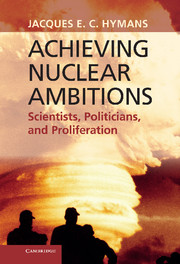Book contents
- Frontmatter
- Contents
- Figures
- Table
- Preface
- Abbreviations
- 1 The puzzle of declining nuclear weapons project efficiency
- 2 A theory of nuclear weapons project efficiency and inefficiency
- 3 Spinning in place
- 4 How did China’s nuclear weapons project succeed?
- 5 Proliferation implications of international civil nuclear cooperation
- 6 Proliferation implications of footloose nuclear scientists
- 7 Empirical extensions
- 8 Lessons for policymakers and directions for future research
- References
- Index
- References
7 - Empirical extensions
Libya, Pakistan, North Korea, Iran
Published online by Cambridge University Press: 05 June 2012
- Frontmatter
- Contents
- Figures
- Table
- Preface
- Abbreviations
- 1 The puzzle of declining nuclear weapons project efficiency
- 2 A theory of nuclear weapons project efficiency and inefficiency
- 3 Spinning in place
- 4 How did China’s nuclear weapons project succeed?
- 5 Proliferation implications of international civil nuclear cooperation
- 6 Proliferation implications of footloose nuclear scientists
- 7 Empirical extensions
- 8 Lessons for policymakers and directions for future research
- References
- Index
- References
Summary
In this book I have presented in-depth studies of four country cases: Iraq, China, Yugoslavia, and Argentina. I chose these historical cases due to their value for theory-testing. One of the key reasons why they were valuable was the availability of minutely detailed information on their nuclear programs’ internal dynamics. As a result, in the case study chapters we have been able to witness the multiple pathways via which nuclear weapons project efficiency can be helped or hampered by the state’s management approach, and behind that, by its institutions. This would not have been possible if I had chosen to study the “hottest” cases for the proliferation literature at present – cases such as Libya, Pakistan, North Korea, and Iran – since their internal dynamics generally remain quite shrouded in mystery.
However, now that the theory has passed a series of punishing tests, it is worth considering, in a preliminary manner, how the theory might apply to the more recent cases.
- Type
- Chapter
- Information
- Achieving Nuclear AmbitionsScientists, Politicians, and Proliferation, pp. 239 - 261Publisher: Cambridge University PressPrint publication year: 2012

